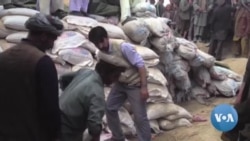ນັບຕັ້ງແຕ່ການຍົກຍ້າຍພັນທະມິດຊາວອັຟການິສຖານຫຼາຍພັນຄົນ ລຸນຫຼັງການຖອນໂຕອອກຈາກປະເທດດັ່ງກ່າວຂອງສະຫະລັດ ມາໄດ້ນຶ່ງປີ, ກະຊວງການຕ່າງປະເທດຂອງສະຫະລັດ ໄດ້ຖືກມອບໝາຍໃຫ້ກໍານົດ ວິທີການໃຫ້ຄວາມຊ່ວຍເຫຼືອທາງດ້ານມະນຸດສະທໍາແກ່ປະຊາຊົນຊາວອັຟການິສຖານ ທີ່ດຳລົງຊີວິດພາຍໃຕ້ການປົກຄອງຂອງກຸ່ມຕາລິບານ ໃນຊ່ວງຂອງການຂາດແຄນອາຫານຢ່າງຮ້າຍແຮງ. ນັກຂ່າວອາວຸໂສທາງການທູດ ຂອງ VOA, ຊິນດີ ເຊນ (Cindy Saine) ມີລາຍງານຫຼ້າສຸດ ກ່ຽວກັບເລື້ອງນີ້ ເຊິ່ງ ທິບສຸດາ ມີລາຍລະອຽດມາສະເໜີທ່ານໃນອັນດັບຕໍ່ໄປ.
ກຸ່ມສິດທິມະນຸດ ແລະອົງການບັນເທົາທຸກຕ່າງໆ ກ່າວວ່າ ສະຖານະການຂອງປະຊາຊົນຊາວອັຟການິສຖານ ແມ່ນກໍາລັງຢູ່ໃນໄພຫາຍະນະ, ເຊິ່ງບາງຄົນຕ້ອງໄດ້ຂາຍອະໄວຍະວະຂອງຕົນເອງ ຫຼື ຂາຍລູກເຕົ້າຂອງພວກເຂົາເພື່ອຄວາມຢູ່ລອດ. ນຶ່ງປີຫຼັງຈາກການຖອນກຳລັງທະຫານ ແລະບັນດານັກການທູດຂອງອາເມຣິກາ ອອກໄປ, ສະຫະລັດ ຍັງຄົງເປັນປະເທດດຽວ ທີ່ບໍລິຈາກການຊ່ວຍເຫຼືອດ້ານມະນຸດສະທໍາ ທີ່ຫຼາຍທີ່ສຸດ.
ທ່ານເຟເຣັສຕາ ອັບບາຊີ ປະຈຳອົງການປົກປ້ອງສິດທິມະນຸດ Human Rights Watch (HRW) ກ່າວຜ່ານທາງສໄກປ໌ວ່າ:
“ອີງຕາມສະຖິຕິຫຼ້າສຸດທີ່ໂຄງການອາຫານໂລກ ໄດ້ພິມເຜີຍແຜ່ອອກມາ, ກໍແມ່ນວ່າ 90 ເປີເຊັນຂອງປະຊາຊົນຊາວອັຟການິສຖານກໍາລັງປະເຊີນກັບສະພາບຄວາມບໍ່ໝັ້ນຄົງທາງດ້ານອາຫານ ລຸນຫຼັງທີ່ກຸ່ມຕາລິບານເຂົ້າຢຶດອໍານາດມາໄດ້ນຶ່ງປີ, ປະຊາຊົນກໍາລັງ ຕາຍຍ້ອນຄວາມອຶດຫິວ. ນັ້ນໝາຍຄວາມວ່າ ປະຊາຊົນເຫຼົ່ານັ້ນບໍມີຫຍັງຊິກິນແລ້ວ.”
ກຸ່ມຕາລິບານພາກັນສະເຫຼີມສະຫຼອງ ໃນລະຫວ່າງທີ່ພວກເຂົາກໍານົດເອົາ ວັນຈັນແລ້ວນີ້ ເປັນຂີດໝາຍຄົບຮອບນຶ່ງປີ ນັບຕັ້ງແຕ່ພວກເຂົາກັບເຂົ້າມາຢຶດອໍານາດໄດ້ອີກຄັ້ງ ຈາກລັດຖະບານໃນນະຄອນຫຼວງກາບູລທີ່ສະຫະລັດໜູນຫຼັງ ໂດຍກ່າວວ່າ ພວກເຂົາກໍາລັງຊອກຫາສາຍສໍາພັນທາງດ້ານການເມືອງ ແລະເສດຖະກິດ ທີ່ເຂັ້ມແຂງ ກັບບັນດາປະເທດທີ່ຢູ່ໃນພູມິພາກແຫ່ງນີ້ ແລະປະເທດຕ່າງໆຢູ່ໃນທົ່ວໂລກ.
ແຕ່ລັດຖະບານຂອງທ່ານ ໄບເດັນ ຍັງຄົງມີຄໍາຖາມກ່ຽວກັບການຮັບປະກັນຂອງກຸ່ມຕາລິບານ ໂດຍເນັ້ນໃຫ້ເຫັນເຖິງການສັງຫານຜູ້ຮ້າຍທີ່ຫລົບໜີ ທ້າວເອແມນ ອາລ-ຊາວາຮີຣີ ໃນການໂຈມຕີດ້ວຍເຮືອບິນທີ່ບໍ່ມີຄົນຂັບຂອງສະຫະລັດ ເມື່ອເດືອນແລ້ວນີ້ ຢູ່ທີ່ເຮືອນຫລີ້ໄພຂອງລາວ ໃນໃຈກາງນະຄອນຫຼວງກາບູລ.
ໂຄສົກກະຊວງການຕ່າງປະເທດ ທ່ານເນັດ ໄພຣສ໌ ກ່າວວ່າ ລັດຖະບານທ່ານໄບເດັນຍັງບໍ່ທັນພ້ອມໃນໄລຍະອັນໃກ້ນີ້ ທີ່ຈະປ່ອຍເງິນກອງທຶນ ທີ່ຖືກກັກໄວ້ຢູ່ໃນສະຫະລັດ ກັບຄືນໃຫ້ທະນາຄານກາງຂອງອັຟການິສຖານ, ແຕ່ທາງສະຫະລັດໄດ້ມີການເຈລະຈາກັບທະນາຄານດັ່ງກ່າວ ເປັນເວລາຫຼາຍເດືອນ ໃນການພະຍາຍາມຫາທາງແກ້ໄຂກ່ຽວກັບເລື້ອງນີ້, ເຊິ່ງທ່ານໄດ້ກ່າວວ່າ:
“ໃນຂະນະນີ້, ພວກເຮົາກໍາລັງມອງຫາກົນໄກຕ່າງໆທີ່ສາມາດນໍາມາໃຊ້ ເພື່ອເບິ່ງວ່າ ຊັບສິນຈໍານວນ 3 ຕື້ 500 ລ້ານໂດລາ ທີ່ເກັບຮັກສາໄວ້ຢູ່ນີ້ ຈະນໍາເອົາໄປໃຊ້ຢ່າງມີປະສິດທິພາບ ແລະປະສິດທິຜົນໃຫ້ແກ່ປະຊາຊົນຊາວອັຟການິສຖານ ໃນທາງທີ່ບໍ່ເຮັດໃຫ້ເງິນເຫຼົ່ານີ້ຕົກເຫ່ຍເສຍຫາຍ ໄປຫາກຸ່ມກໍ່ການຮ້າຍ ຫຼືບ່ອນອື່ນໆ.”
ບັນດານັກຊ່ຽວຊານບອກກັບ VOA ວ່າ ຄວາມຈິງ ກໍແມ່ນວ່າ ຜູ້ນໍາຂອງກຸ່ມອາລ-ໄກດາ ໄດ້ອາໄສຢູ່ໃຈກາງຂອງນະຄອນຫຼວງກາບູລ ກັບຄອບຄົວຂອງພວກເຂົາ ໄດ້ເຮັດໃຫ້ເປັນຜົນເສຍ ໃນຄວາມພະຍາຍາມທີ່ຈະປົດປ່ອຍຊັບສິນເຫຼົ່ານັ້ນ.
ທ່ານໄມໂກລ ຄູໂກລແມນ (Michael Kugelman), ຈາກສູນກາງວິລສັນ ກ່າວຜ່ານທາງສໄກປ໌ວ່າ:
“ໃນເວລານີ້ ຂ້າພະເຈົ້າຄິດວ່າ ໃນສິ່ງທີ່ເກີດຂຶ້ນກັບທ້າວ ອາລ-ຊາວາຮີຣີ ນັ້ນ ສະຫະລັດກໍາລັງເອົາແນວທາງທີ່ໜັກແໜ້ນກວ່າເກົ່າ ແລະພວກເຂົາເຈົ້າ ກໍຈະບໍ່ເຫັນດີກັບຂໍ້ຕົກລົງໃດໆທີ່ຈະປ່ອຍເງິນທຶນເຫຼົ່ານັ້ນ ຄືນໃຫ້ຊາວອັຟການິສຖານຄວບຄຸມເງິນ ຍົກເວັ້ນແຕ່ວ່າ ມີກົນໄກທີ່ແນ່ນອນ, ຄາດວ່າ ບາງກອງທຶນ ປະເພດໃດນືຶ່ງ ທີ່ໄດ້ຮັບການເບິ່ງແຍງທີ່ແຍກອອກຕ່າງຫາກນັ້ນ ເພື່ອເປັນກໍາແພງປ້ອງກັນ ບໍ່ໃຫ້ສິ່ງໃດກໍຕາມທີ່ກຸ່ມຕາລິບານ ພະຍາຍາມທີ່ຈະເຮັດ. ກຸ່ມຕາລິບານກໍາລັງນໍາໃຊ້ແນວທາງທີ່ໜັກແນ້ນ. ສໍາລັບເຫດຜົນທາງດ້ານການເມືອງແລ້ວ, ກຸ່ມຕາລິບານ ຕ້ອງຮັບປະກັນຄວາມຖືກຕ້ອງທາງກົດໝາຍຂອງພວກຄົນໃນຖັນແຖວຂອງເຂົາເຈົ້າ.”
ນັກຊ່ຽວຊານທັງຫຼາຍ ລວມທັງ ທ່ານອັບບາຊີ ກ່າວວ່າ ປະຊາຄົມນານາຊາດ ລວມເຖິງສະຫະລັດ, ແນ່ນອນວ່າ ຕ້ອງກ້າວຂຶ້ນມາ ໃນການເພີ້ມຄວາມຊ່ວຍເຫຼືອທາງດ້ານມະນຸດສະທໍາ ແກ່ພົນລະເຮືອນຊາວອັຟການິສຖານ. ແຕ່ພວກເຂົາເຈົ້າ ກໍຍັງໄດ້ຮຽກຮ້ອງໃຫ້ກຸ່ມຕາລິບານ ຈົ່ງພິຈາລະນາຄືນໃໝ່ບູລິມະສິດຂອງພວກເຂົາ ແລະແກ້ໄຂຄວາມຕ້ອງການຂັ້ນພື້ນຖານຂອງປະຊາຊົນ ແທນທີ່ວ່າ ຈະເພີ້ມຂໍ້ຈໍາກັດໃນດ້ານສິດທິຂອງບັນດາແມ່ຍິງຕື່ມອີກ ຢູ່ໃນປະເທດອັຟການິສຖານ.
Since evacuating tens of thousands of Afghan allies following the U.S. withdrawal from the country a year ago, the State Department has been tasked with determining how to provide humanitarian aid to Afghans living under the Taliban during a serious food shortage. VOA's Senior Diplomatic Correspondent Cindy Saine provides an update.
Human rights groups and relief agencies say the situation for the Afghan people is a catastrophe, with some selling their organs or their children to survive. One year after withdrawing American troops and diplomats, the United States is still the single largest donor of humanitarian aid to the country. Fereshta Abbasi is the Afghanistan researcher for Human Rights Watch.
Fereshta Abbasi, Human Rights Watch by Skype
“According to the latest statistics that the World Food Program have published, 90 percent of Afghan people are facing food insecurity one year after the Taliban takeover. People are dying out of hunger. It means that people do not have anything to eat.”
The Taliban celebrated as they marked one year Monday since they retook power from the U.S.-backed government in Kabul, saying they are seeking strong political and economic relationships with all the countries of the region and the world.
But the Biden administration is questioning the Taliban's assurances,
pointing to last month’s killing of fugitive al-Qaida leader Ayman al-Zawahiri in a U.S. drone strike at his safe house in the heart of Kabul.
State Department spokesperson Ned Price said the Biden administration is not ready in the near term to release the funds held in the United States back to Afghanistan’s central bank, but it has been negotiating with the bank for months to try to find a solution.
Ned Price, State Department Spokesperson
“Right now, we’re looking at mechanisms that could be put in place to see to it that these $3.5 billion in preserved assets make their way efficiently and effectively to the people of Afghanistan in a way that doesn’t make them ripe for diversion to terrorist groups or elsewhere.”
Experts tell VOA that the fact that the al-Qaida leader was living right in the middle of Kabul with his family dealt a blow to efforts to release the assets.
Michael Kugelman, Wilson Center by Skype
“Now I think that in light of what happened with al-Zawahri the U.S. is going to take an even harder line and they will not agree to any type of arrangement to release those funds back to Afghan control unless there is a clear mechanism in place, presumably some type of separate trust fund that would wall off the funds from whatever the Taliban would try to do. The Taliban is going to take a hard line. The Taliban, for political reasons, it has to ensure the legitimacy of its rank and file.”
Experts, including Abbasi, say the international community, including the United States, certainly needs to step up humanitarian aid to Afghan civilians. But they are also calling on the Taliban to reconsider their priorities and address people’s basic needs instead of putting more restrictions on women's rights in Afghanistan.










